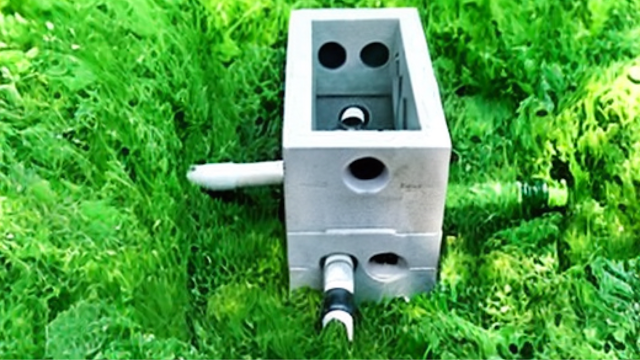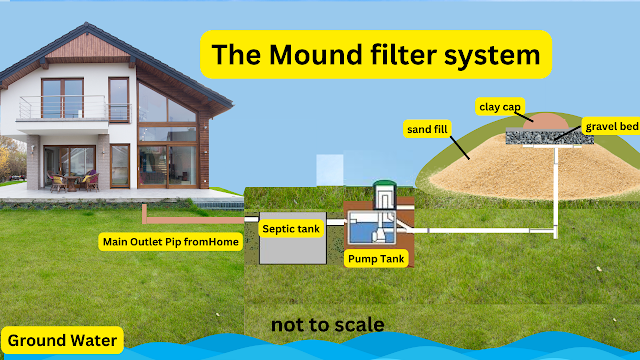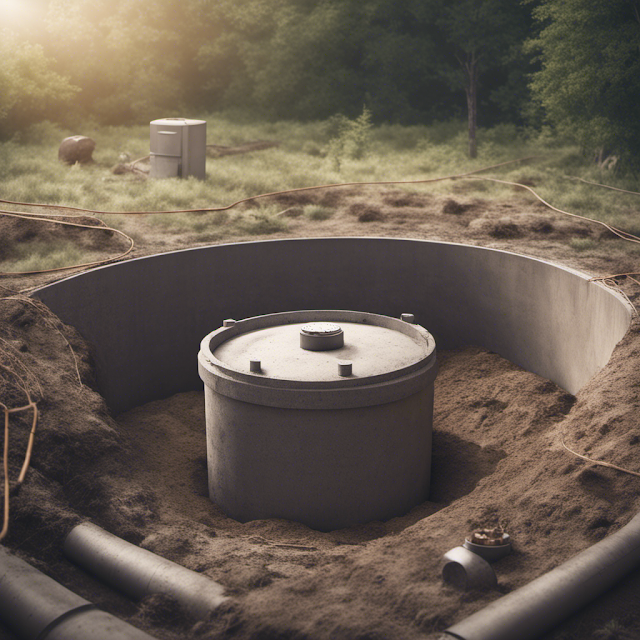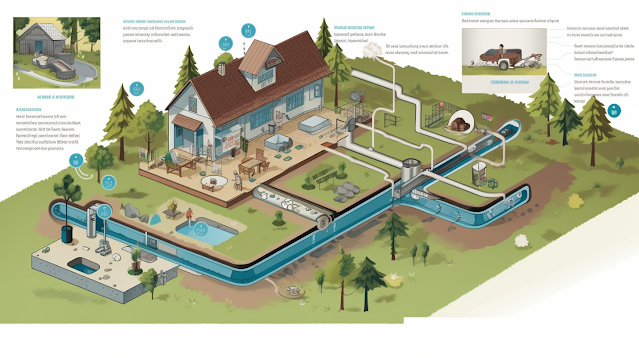Benefits of using a septic tank
 |
| Benefits of Using a Septic Tank are many |
Introduction
If you're in search of a cost-effective, environmentally friendly, and reliable wastewater management system, look no further than septic tanks. These underground systems are a popular choice for homeowners in rural areas, and for good reason. In this article, we will explore the many benefits of using a septic tank, from environmental and economic advantages to its suitability for rural living.
If you're ready to give your septic system the attention it requires, we invite you to check out our unique guide available on our blog, "The Septic Tankers." Our guide is specifically designed to help homeowners like you understand the nuances of septic systems and take the necessary steps to keep your system functioning efficiently.
What is a septic tank?
How does a septic tank work?
A septic tank is an underground wastewater treatment system that processes and treats household sewage. It consists of a large, watertight container made from materials like concrete, fiberglass, or plastic. The tank receives wastewater from your home, allowing solids to settle at the bottom and form a sludge layer. The liquid wastewater, or effluent, remains in the middle layer, while fats and oils float to the top, creating a scum layer. The effluent is then released into a drain field, where it percolates through the soil, which acts as a natural filter.
Environmental benefits
Groundwater protection
Septic tanks play a vital role in protecting groundwater sources from contamination. By treating wastewater on-site, they prevent the discharge of untreated sewage into the environment. The soil in the drain field acts as a natural filter, removing harmful bacteria and viruses before the water reaches the groundwater.
Reduced pollution
Properly functioning septic systems help reduce surface water pollution. Untreated wastewater can contaminate rivers, lakes, and other bodies of water, harming aquatic life and posing risks to human health. Septic tanks effectively treat wastewater, ensuring that the effluent released into the environment is clean and safe.
Sustainable wastewater management
Septic tanks promote sustainable wastewater management by using natural processes for treatment. They do not require electricity to function, and the treated water can recharge groundwater sources, making them an environmentally responsible choice for homeowners.
Economic benefits
Cost-effective installation
Compared to centralized sewage systems, septic tanks are more cost-effective to install. They do not require extensive infrastructure, such as sewer lines and treatment plants, making them an affordable option for rural and remote areas.
Low maintenance costs
Septic tanks have relatively low maintenance costs. Regular inspections and pumping every three to five years are generally sufficient to keep the system functioning properly. Additionally, because septic systems do not rely on electricity, homeowners can save on energy costs.
Increased property value
Having a well-maintained septic system can increase the value of your property. Potential buyers may appreciate the benefits of an eco-friendly, self-sufficient wastewater management solution, making your property more attractive in the real estate market.
Advantages for rural areas
Self-sufficiency
Septic tanks offer self-sufficiency in wastewater management for rural homeowners. They do not rely on centralized sewer systems, which may be unavailable or impractical in remote locations. This independence can be particularly valuable in areas prone to natural disasters, where access to public utilities may be disrupted.
Adaptable to various terrains
Septic tanks can be installed in a variety of terrains and soil conditions, making them a versatile option for rural properties. They can be adapted to suit the specific needs and topography of your land, ensuring an efficient and reliable wastewater management system.
 |
| Septic Tanks can be installed virtually anywhere |
The benefits of using a septic tank are numerous, from environmental and economic advantages to its suitability for rural living. By protecting groundwater sources, reducing pollution, and promoting sustainable wastewater management, septic tanks offer an eco-friendly solution for homeowners. Their cost-effective installation, low maintenance costs, and adaptability to various terrains make them an ideal choice for rural areas. So, if you're considering a wastewater management system for your property, a septic tank is a smart and responsible choice.
FAQs
How often should I have my septic tank pumped?
Most septic tanks need to be pumped every three to five years. However, the frequency depends on factors such as the size of your tank, the number of people living in your household, and the amount of wastewater generated.Can I use a garbage disposal with a septic tank?
While it is possible to use a garbage disposal with a septic tank, it is generally not recommended. Garbage disposals can increase the amount of solids entering the tank, which can lead to more frequent pumping and potential system failure.Are there any household items I should avoid flushing down the toilet or drains with a septic system?
Yes, you should avoid flushing items such as diapers, wipes, feminine hygiene products, and grease or oils, as these can clog the system and lead to failure. Additionally, avoid using harsh chemicals and cleaners, which can kill the beneficial bacteria in the tank and disrupt the treatment process.How can I tell if my septic system is failing?
Warning signs of a failing septic system include slow-draining sinks and toilets, foul odors around the drain field, standing water or lush, green grass over the septic tank or drain field, and sewage backup in your home.What can I do to maintain a healthy septic system?
To maintain a healthy septic system, have your tank inspected and pumped regularly, conserve water to reduce the load on the system, avoid flushing inappropriate items, and use septic-safe cleaning products. It's also important to keep heavy vehicles and structures off the drain field to prevent damage.What is the average lifespan of a septic tank?
The average lifespan of a septic tank can range from 20 to 40 years, depending on the materials used, proper installation, and regular maintenance. Concrete tanks generally have a longer lifespan, while plastic or fiberglass tanks may need replacement sooner.
Can I plant trees or shrubs near my septic tank or drain field?
It's best to avoid planting trees or large shrubs near your septic tank or drain field, as their roots can grow into and damage the system. Instead, choose grass or shallow-rooted plants that will not interfere with the septic system components.
How do I locate my septic tank if I don't know where it is?
To locate your septic tank, you can check your property's "as-built" drawings or contact your local health department for records. You can also try probing the ground with a metal rod to find the tank's edges or hiring a professional septic service company to help locate the tank using specialized equipment.
What should I do if I suspect my septic tank has a leak?
If you suspect your septic tank has a leak, contact a professional septic service company to inspect and assess the situation. A leaking septic tank can pose a risk to your health and the environment, so it's crucial to address the issue promptly.
Do septic tanks have any impact on the quality of well water?
A properly maintained and functioning septic system should not impact the quality of well water.
However, if a septic system is failing or leaking, it can contaminate nearby groundwater sources, including well water. To protect your well water quality, ensure your septic system is regularly inspected and maintained, and keep the well and septic system at a safe distance from each other, following local regulations and guidelines.
.png) |
| Septic System Installation with a bit of Mess |
What is a Septic Tank: Advantages and Disadvantages?
Introduction
Although its a popular choice for homeowners, especially in rural areas where municipal sewage systems may not be available. However, like any system, septic tanks have their pros and cons. In this section to finish off the article, we will look into the advantages and disadvantages of septic tanks to help you make an informed decision.
Advantages of Septic Tanks
Cost-effective
One of the main benefits of a septic tank is its cost-effectiveness. Compared to connecting to a municipal sewer system, installing and maintaining a septic tank can be much more affordable in the long run. This can be a major selling point for homeowners looking to save money.
Environmentally friendly
Septic tanks can be an eco-friendly wastewater management option. They use natural processes to break down and filter waste, reducing the amount of harmful chemicals and pollutants that enter the environment. This can lead to cleaner water sources and a healthier ecosystem.
Low maintenance
While routine maintenance is necessary, septic tanks generally require less upkeep compared to other wastewater treatment options. With proper care, a septic system can last for decades, minimizing the time and resources needed for maintenance.
Longevity
A well-maintained septic tank can last between 20 and 30 years, sometimes even longer. This durability makes septic tanks a long-term investment for homeowners.
Water conservation
Septic systems can promote water conservation. By recycling treated wastewater for irrigation purposes, homeowners can save water and reduce their impact on local water sources.
Self-sufficiency
A septic tank allows homeowners to be self-sufficient when it comes to wastewater treatment. This can be particularly beneficial in remote areas where access to public utilities may be limited or unavailable.
Suitable for rural areas
Septic tanks are ideal for rural properties that lack access to municipal sewage systems. They provide an efficient and effective way to manage wastewater independently.
Disadvantages of Septic Tanks
Limited capacity
Septic tanks have a limited capacity, which can be an issue for larger households or properties with high water usage. Overloading the tank can lead to costly repairs and potential environmental issues.
Potential for groundwater contamination
If a septic tank is not properly maintained or installed, there is a risk of groundwater contamination. This can have negative impacts on the environment and pose a threat to public health.
Maintenance and repairs
Although septic tanks generally require less maintenance than other wastewater treatment systems, they still need periodic inspections and pumping. Additionally, repairs can be costly if problems arise.
Not suitable for high-density areas
Septic tanks are not the best option for densely populated areas or properties with limited space. They require a certain amount of land for proper installation and function.
Legal restrictions and zoning issues
Some areas have strict regulations regarding septic tank installation and use. Homeowners may face legal restrictions or zoning issues when trying to install a septic system.
Conclusion
Septic tanks offer a range of advantages, including cost-effectiveness, environmental benefits, and self-sufficiency. They are especially suitable for rural areas and can provide a long-lasting wastewater management solution. However, they also come with certain disadvantages, such as limited capacity, potential groundwater contamination, and maintenance requirements. Additionally, septic tanks may not be suitable for high-density areas and could face legal restrictions.
In conclusion, when considering whether a septic tank is the right option for your property, it's essential to weigh the advantages and disadvantages. By understanding the benefits and drawbacks, you can make an informed decision that best suits your needs and preferences. As Septic Tank service engineers and installers even we appreciate that not all situations are the best for a septic tank.
FAQs
1. Can I install a septic tank on a property with a high water table?
It is possible to install a septic tank on a property with a high water table, but it may require additional measures such as a raised drain field or a mound system to ensure proper function and prevent contamination.
2. Are there any alternatives to a traditional septic tank system?
Yes, there are several alternatives to traditional septic tank systems, including aerobic treatment units, constructed wetlands, and composting toilets. These alternative systems can offer additional benefits and may be more suitable for certain property types or environmental conditions.
3. How can I tell if my septic tank is experiencing problems?
Common signs of septic tank problems include slow draining sinks or toilets, sewage backup, foul odors, soggy ground near the drain field, or unusually green or lush vegetation in the area. If you suspect a problem with your septic tank, it's important to consult a professional for assessment and necessary repairs.
4. Can I use a garbage disposal with a septic tank?
While it is possible to use a garbage disposal with a septic tank, it's generally not recommended. Garbage disposals can increase the amount of solid waste entering the tank, which can lead to more frequent pumping and potential issues with the system. If you decide to use a garbage disposal, make sure to choose a model specifically designed for septic systems and use it sparingly.
5: Are septic tanks a more cost-effective option compared to conventional plumbing? A: Yes, septic tanks can be a more cost-effective alternative to conventional plumbing in certain situations. The initial installation cost of a septic tank system may be higher, but the ongoing maintenance expenses are generally lower than those associated with municipal sewer systems. Additionally, septic tanks can offer long-term savings by eliminating monthly sewer fees. However, the overall cost-effectiveness of a septic tank depends on factors such as property size, location, and individual water usage habits.
.png)



.png)






Comments
Post a Comment